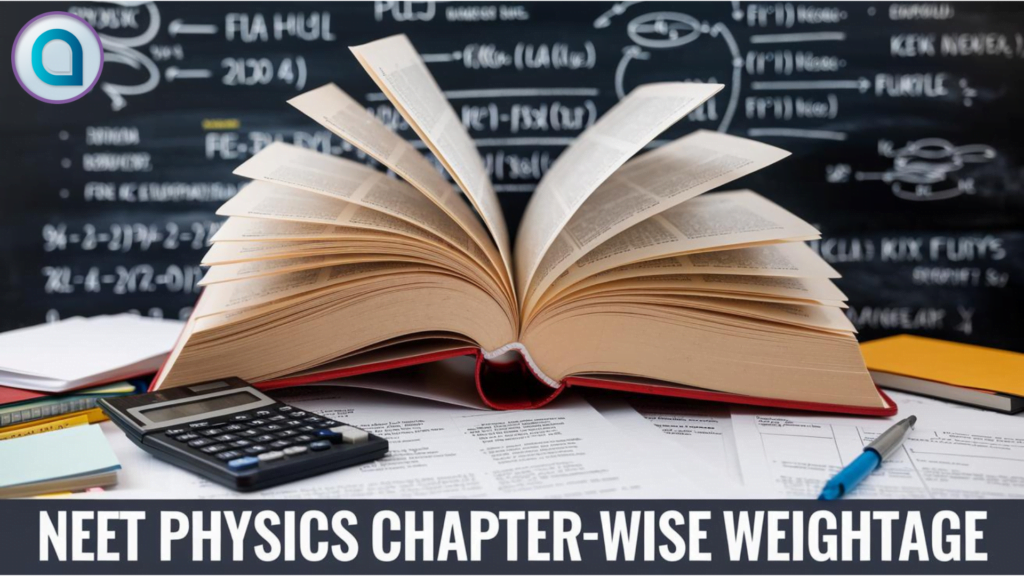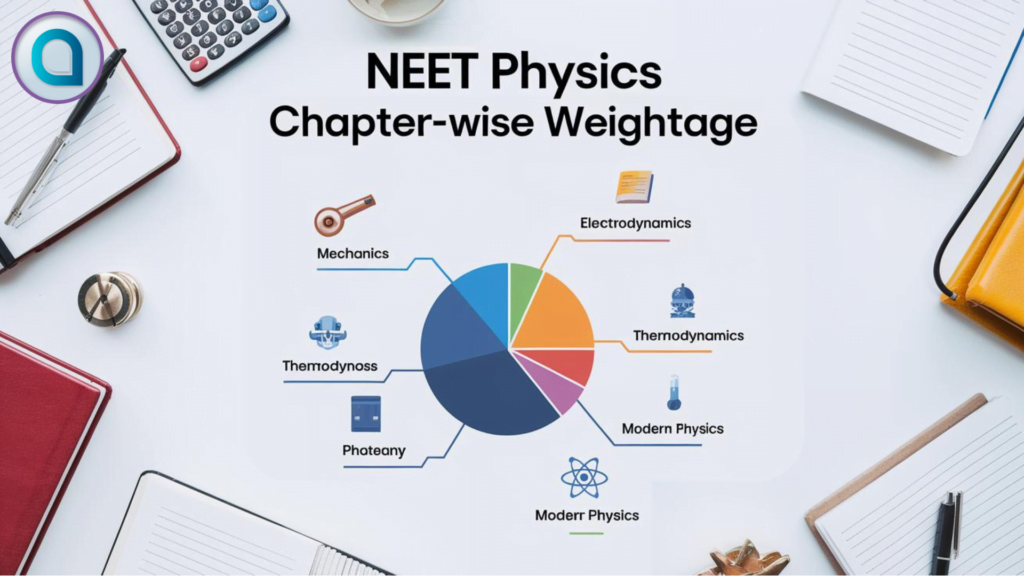NEET Physics Chapter-wise Weightage 2025
The National Eligibility cum Entrance Test (NEET) is an important milestone for aspiring medical students in India. With Physics often being considered one of the most challenging subjects, understanding the chapter-wise weightage is essential for effective preparation. In this article, we’ll explore the chapter-wise weightage for NEET Physics 2025, providing insights into the most important topics.
Understanding the Importance of Chapter-wise Weightage
Physics is a subject that requires a strong grasp of concepts and the ability to apply them to various problems. The NEET Physics syllabus is vast, encompassing topics from both Class 11 and Class 12. Given the limited time available for preparation, it’s important to focus on the chapters that carry the most weight in the exam. By understanding the chapter-wise weightage, you can prioritize your study plan, ensuring that you cover the most important topics thoroughly.
NEET Physics Syllabus Overview
The NEET Physics syllabus is divided into two sections: Class 11 and Class 12. Each section includes multiple chapters, covering a wide range of topics. Here’s a brief overview of the NEET Physics syllabus:
Class 11 Physics Syllabus
- Units and Measurements
- Motion In a Straight Line
- Motion In a Plane
- Laws Of Motion
- Work, Energy, and Power
- System of Particles and Rotational Motion
- Gravitation
- Mechanical Properties of Solid
- Mechanical Properties of Fluids
- Thermal Properties Of Matter
- Thermodynamics
- Kinetic Theory of Gases
- Oscillations
- Waves
Class 12 Physics Syllabus
- Electric Charges And Fields
- Electrostatic Potential and Capacitance
- Current Electricity
- Moving Charges And Magnetism
- Magnetism And Matter
- Electromagnetic Induction
- Alternating Current
- Electromagnetic Waves
- Ray Optics And Optical Instruments
- Wave Optics
- Dual Nature of Radiation and Matter
- Atoms
- Nuclei
- Semiconductor Electronics
Chapter-wise Weightage for NEET Physics 2025
While the exact weightage may vary slightly each year, historical trends and expert analysis can provide a reliable estimate. Here’s a detailed breakdown of the chapter-wise weightage for NEET Physics 2025:
|
NEET Chapter Wise Weightage 2025 for Physics |
||
|
Physics Chapters/Topics |
Average No. of Questions |
Weightage (%) |
|
Mechanical Properties of Solids |
1 |
2% |
|
Moving Charges and Magnetism |
2 |
5% |
|
Center of Mass & System of Particles |
1 |
2% |
|
Wave Optics |
1 |
2% |
|
Electromagnetic Induction |
1 |
3% |
|
Mechanical Properties of Fluids |
2 |
3% |
|
Electromagnetic Waves |
2 |
3% |
|
Rotational Motion |
3 |
6% |
|
Oscillations |
1 |
3% |
|
Ray Optics and Optical Instruments |
3 |
6% |
|
Kinetic Theory of Gases |
1 |
3% |
|
Dual Nature of Radiation and Matter |
2 |
3% |
|
Gravitation |
2 |
3% |
|
Current Electricity |
5 |
10% |
|
Semiconductor Electronics: Materials, Devices and Simple Circuits |
3 |
5% |
|
Units and Measurements |
3 |
5% |
|
Work Energy and Power |
2 |
3% |
|
Electric Charges and Fields |
2 |
3% |
|
Magnetism and Matter |
1 |
1% |
|
Atoms |
1 |
3% |
|
Nuclei |
2 |
4% |
|
Motion in a Plane |
1 |
3% |
|
Mathematical Tools & Vectors |
1 |
1% |
|
Laws of Motion |
1 |
2% |
|
Thermodynamics |
1 |
2% |
|
Waves |
1 |
1% |
|
Electrostatic Potential and Capacitance |
3 |
5% |
|
Alternating Current |
2 |
4% |
|
Thermal Properties of Matter |
0 |
1% |
|
Motion in a Straight Line |
1 |
3% |
NEET Physics Chapter-wise Weightage Following Previous Year’s Trends
NEET Physics chapter-wise weightage is important for strategic preparation. By analyzing previous years’ trends, you can identify which chapters are most important. Focusing on these high-weightage chapters can boost your chances of scoring well. Understanding the trends helps you prioritize your study time effectively, ensuring that you cover the most critical areas for the exam.
|
NEET Physics Chapterwise Weightage Following Previous Year’s Trends |
|||||||
|
Chapter Name |
2019 |
2020 |
2021 |
2022 |
2023 |
Total 5 yrs PYQ |
Average Count |
|
Mechanical Properties of Solids |
1 |
1 |
0 |
1 |
1 |
4 |
1 |
|
Moving Charges and Magnetism |
2 |
1 |
4 |
3 |
2 |
12 |
2 |
|
Center of Mass & System of Particles |
2 |
1 |
1 |
2 |
0 |
6 |
1 |
|
Wave Optics |
1 |
2 |
0 |
1 |
1 |
5 |
1 |
|
Electromagnetic Induction |
2 |
0 |
1 |
2 |
2 |
7 |
1 |
|
Mechanical Properties of Fluids |
3 |
1 |
1 |
2 |
2 |
9 |
2 |
|
Electromagnetic Waves |
2 |
2 |
2 |
2 |
1 |
9 |
2 |
|
Rotational Motion |
10 |
1 |
2 |
2 |
1 |
16 |
3 |
|
Oscillations |
2 |
1 |
2 |
1 |
1 |
7 |
1 |
|
Ray Optics and Optical Instruments |
3 |
2 |
4 |
3 |
3 |
15 |
3 |
|
Kinetic Theory of Gases |
1 |
2 |
2 |
1 |
1 |
7 |
1 |
|
Dual Nature of Radiation and Matter |
2 |
2 |
2 |
2 |
1 |
9 |
2 |
|
Gravitation |
2 |
1 |
3 |
1 |
2 |
9 |
2 |
|
Current Electricity |
4 |
6 |
6 |
5 |
5 |
26 |
5 |
|
Semiconductor Electronics: Materials, Devices and Simple Circuits |
2 |
3 |
3 |
3 |
3 |
14 |
3 |
|
Units and Measurements |
3 |
3 |
3 |
3 |
2 |
14 |
3 |
|
Work Energy and Power |
4 |
0 |
1 |
2 |
1 |
8 |
2 |
|
Electric Charges and Fields |
3 |
1 |
1 |
1 |
3 |
9 |
2 |
|
Magnetism and Matter |
1 |
1 |
0 |
1 |
0 |
3 |
1 |
|
Atoms |
2 |
1 |
0 |
1 |
3 |
7 |
1 |
|
Nuclei |
1 |
3 |
3 |
2 |
1 |
10 |
2 |
|
Motion in a Plane |
2 |
0 |
2 |
1 |
2 |
7 |
1 |
|
Mathematical Tools & Vectors |
3 |
0 |
0 |
0 |
0 |
3 |
1 |
|
Laws of Motion |
1 |
1 |
0 |
1 |
2 |
5 |
1 |
|
Thermodynamics |
1 |
2 |
0 |
1 |
1 |
5 |
1 |
|
Waves |
0 |
1 |
0 |
1 |
1 |
3 |
1 |
|
Electrostatic Potential and Capacitance |
0 |
3 |
5 |
4 |
1 |
13 |
3 |
|
Alternating Current |
0 |
2 |
3 |
2 |
4 |
11 |
2 |
|
Thermal Properties of Matter |
0 |
1 |
1 |
0 |
0 |
2 |
0 |
|
Motion in a Straight Line |
0 |
1 |
1 |
2 |
3 |
7 |
1 |
How to Use Chapter-wise Weightage for Effective Preparation
Understanding the chapter-wise weightage is only the first step. Here’s how you can use this information to optimize your NEET Physics preparation:
- Prioritize High-Weightage Chapters: Focus on chapters like Electrodynamics and Mechanics, which have the highest weightage. Ensure that you have a strong grasp of the concepts and practice a variety of problems.
- Allocate Study Time Strategically: Divide your study time based on the weightage of each chapter. Spend more time on chapters that carry more marks and are more challenging.
- Practice Regularly: Regular practice is essential for effective preparation in Physics. Solve previous years’ question papers and take mock tests to familiarize yourself with the exam pattern and difficulty level.
- Revise Thoroughly: Revision is key to remembering information. Make sure to revise high-weightage chapters multiple times to ensure that you can recall concepts and solve problems quickly.
- Focus on Conceptual Clarity: NEET Physics questions often test your understanding of concepts rather than rote memorization. Focus on building a strong conceptual foundation for each chapter.
Conclusion
NEET Physics is a challenging yet rewarding subject that requires a strategic approach to preparation. By understanding the chapter-wise weightage and focusing on high-priority topics, you can optimize your study plan and increase your chances of success. Remember to practice regularly, revise thoroughly and build a strong conceptual foundation. With dedication and hard work, you can master NEET Physics and achieve your dream of becoming a medical professional.
Related Articles
- NEET Biology Syllabus 2025
- NEET Chemistry Syllabus 2025
- NEET Physics Syllabus 2025
- How to prepare for NEET 2025
- Best Books for NEET
- 10 tips to crack NEET in first attempt
- Offline vs. Online NEET Coaching: Which is better?
- 16 tips to prepare NEET at home
- NEET Biology Questions with Solutions for NEET 2025
- 10 Best NEET Coaching Center in India
- Best time to start preparing for NEET
- Chemistry NEET Preparation
- How many marks are required in NEET for MBBS ?
- Motivational Quotes for NEET Aspirants
- How many attempts for NEET?
- Best 5 App for NEET Preparation
- 10 tips to crack NEET in first attempt
- Maharashtra NEET Counselling
- Neet Coaching Center in Ahmedabad
- NEET Coaching Center in Jharkhand
- NEET Coaching Center in Faridabad
- How much time to cover syllabus in NEET Coching?
- NEET Counselling 2024
- NEET PG Syllabus
- Top 10 Govt. Medical Colleges in India
- Top 10 NEET Coaching Centers in Chennai
FAQs about NEET Physics Chapter-wise Weightage
- Why is chapter-wise weightage important for NEET Physics preparation?
Answer. Understanding chapter-wise weightage helps you prioritize your study plan, ensuring that you focus on the most important topics and allocate your time effectively.
- Which chapter carries the most weight in NEET Physics?
Answer. Mechanics and Electrodynamics are among the chapters with the highest weightage in NEET Physics.
- How should I allocate my study time based on chapter-wise weightage?
Answer. Allocate more time to high-weightage chapters like Electrodynamics and Mechanics, while ensuring that you cover all chapters to complete the syllabus.
- Can I skip low-weightage chapters in NEET Physics preparation?
Answer. It’s not advisable to skip any chapters, as questions can be asked from any part of the syllabus. However, you can prioritize high-weightage chapters while revising lower-weightage ones.
- How can I improve my understanding of complex Physics concepts?
Answer. Regular practice, conceptual clarity and seeking help from teachers or online resources can help you improve your understanding of complex Physics concepts.





